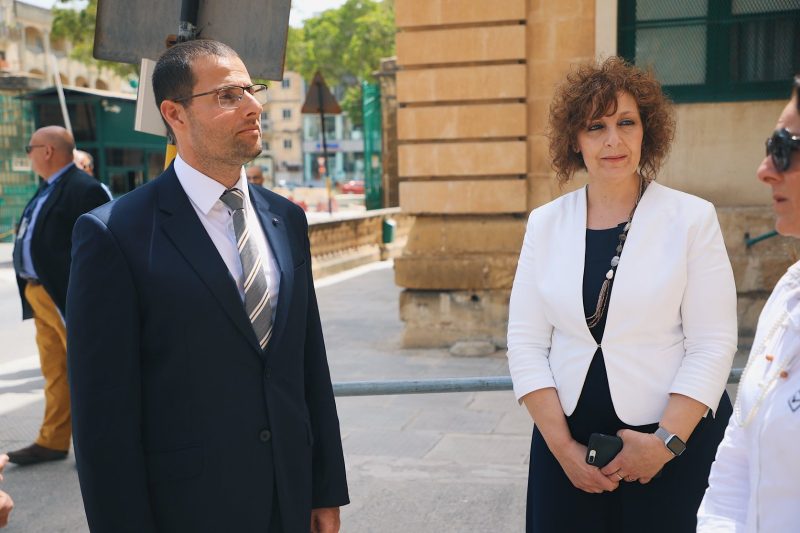We were doing so well. When Malta first introduced restrictive measures in March and announced a public health emergency in April, both were largely well received.
A combination of daily briefs by the Superintendent of Public Health, frequent public announcements and the enforcement of regulations meant that by the first week of July, Covid-19 infections in Malta were fully contained, with no new registered cases for about four days across the first and second weeks of that month.
It also meant that a lot of disinformation related to the pandemic that remains so pervasive in other countries had largely bypassed the island’s social media chatter.
Nonetheless, the movers and shakers in the tourism industry became impatient, and under mounting pressure, the government bungled its strategy for the easing of restrictions. There was no “easing” at all if we consider the decision to open Malta for travel, and for having Tourism Minister Julia Farrugia Portelli promote Malta as a destination for mass events during the pandemic.
To make matters worse, as the daily numbers of those who tested positive for Covid-19 hit a record high in mid-August, Prime Minister Robert Abela kept shuttling between Malta and Sicily, evidently letting nothing get in the way of his holiday. A lot can be said about how leaders behave during a crisis, but this is for another time.
In the face of criticism and resistance, those with a vested economic interest in downplaying the situation wasted no time in spreading disinformation on their social media pages, and in an attempt to assure its supporters that everything was under control, the Labour Party released a video entitled “The truth about the Covid-19 situation in Malta”.
The video makes three claims: that Malta has the highest number of tests in Europe, that Malta has the least number of cases in Europe even though we carry out the most testing, and that only 0.4% of the tests carried out are positive. The video even uses charts and graphs to back these claims so they must be true, right?
Statement 1: Malta has the highest number of tests in Europe
Partially correct – The image that was used to confirm this statement was extrapolated from Our World in Data. It is true that the testing is good in Malta when compared to other European countries.
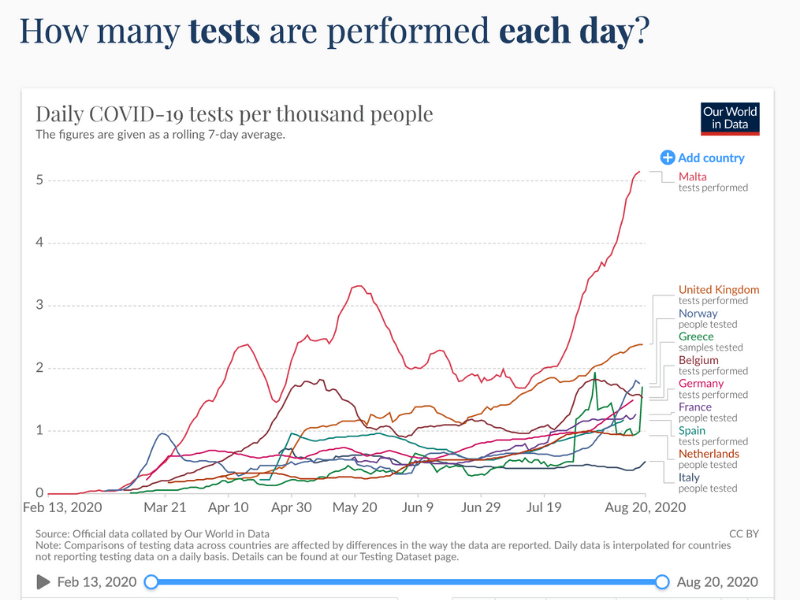
Graph shown in PL promotional video
There are, however, two variables that need to be considered.
The first is that some countries report the number of people tested, while others, like Malta, report the number of tests (which can be higher if the same person is tested more than once).
The second variable is Luxembourg, which is conveniently missing from the chart shown in the video. Once added, this gives a slightly different overview. Malta starts performing the most tests in Europe only after 8 August.
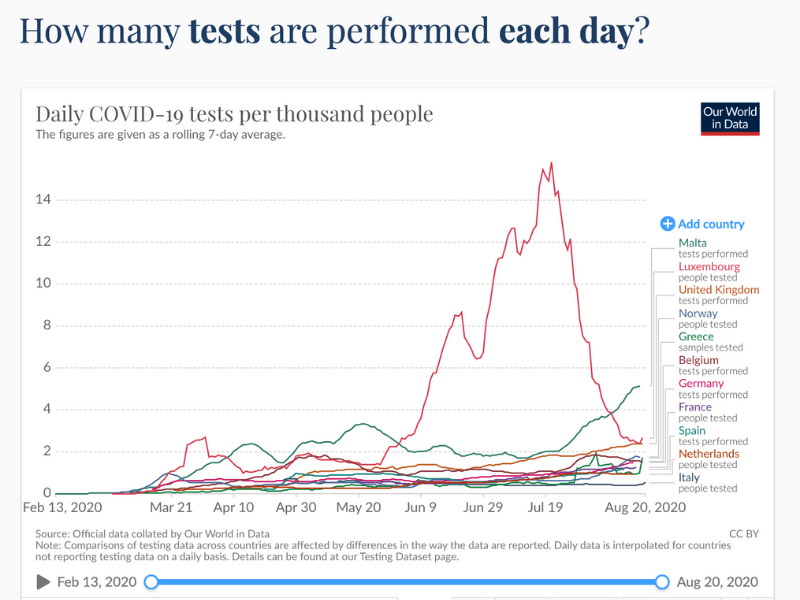
The same graph but with the addition of Luxembourg (dark pink line)
Statement 2: Malta has the least number of cases in Europe even though it has the most testing
Misleading – The graph inserted to support this claim was deliberately selected from Politico’s Covid-19 live data tracker dated to 19 August. Sure, if you’re looking at absolute numbers in terms of the evolution of confirmed cases dating from 2 January to 23 August, then of course Malta is going to be at the bottom, with it being Europe’s smallest population.
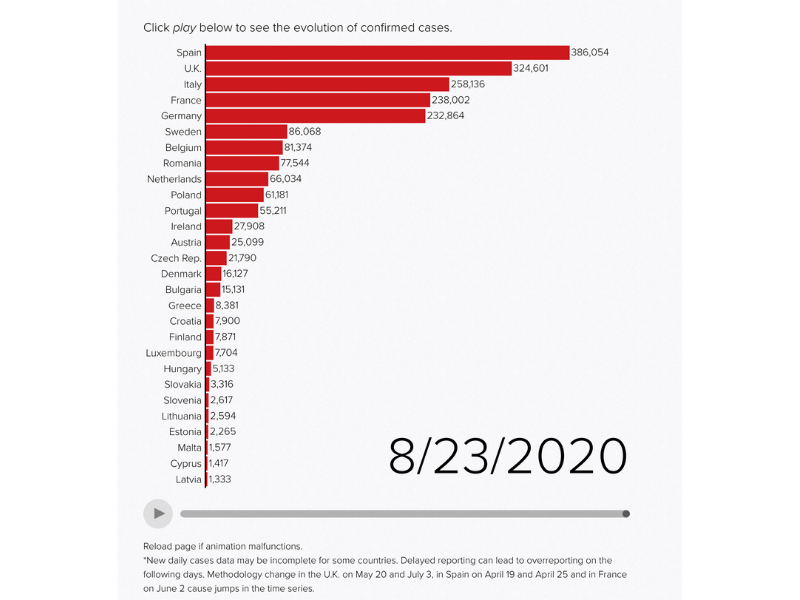
Graph showing cumulative evolution of confirmed Covid-19 cases from February to August
What the video doesn’t show is the chart that follows, which outlines the coronavirus evolution in the last two weeks in confirmed cases per million citizens.
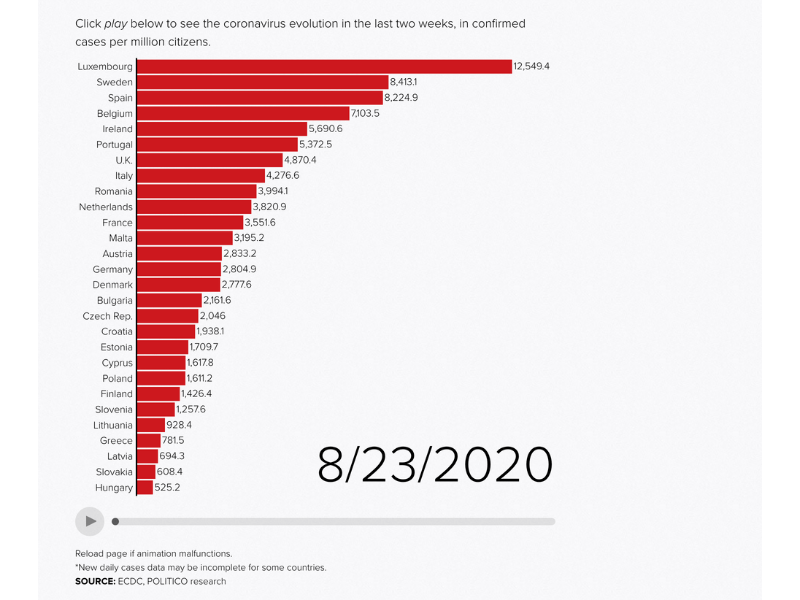
Graph showing evolution of confirmed Covid-19 cases per million citizens in the last two weeks
Here Malta is nowhere near the bottom. It’s sitting under France but above Austria, Germany, Cyprus and Greece, in 12th position out of 28. The reason we use per million or per 100,000 when calculating rates is so that one can determine the needs of any given population relative to another population, regardless of size.
Statement 3: Only 0.4% of the test carried out result in positive cases
Mostly False – The last time Malta reported 0.4% in the share of daily Covid-19 tests that resulted positive was on 1 August.
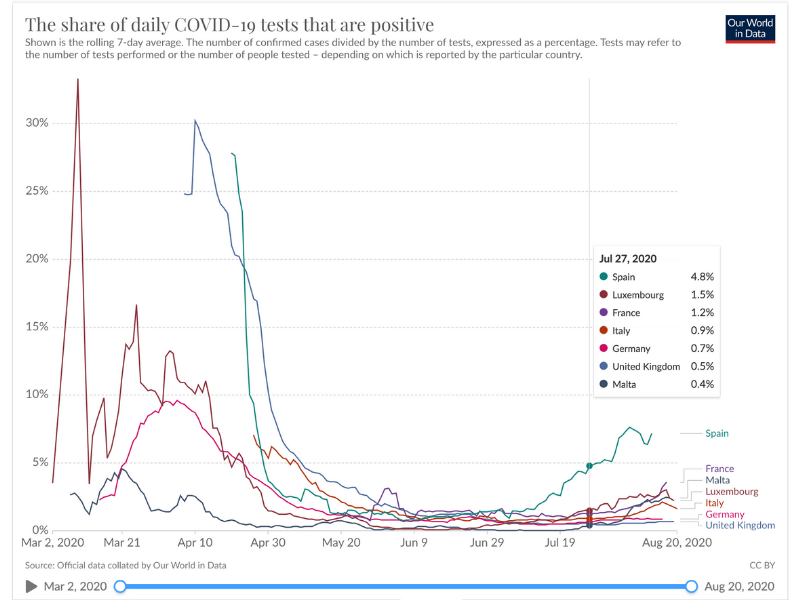
Graph showing the date when Malta had registered 0.4% in share of daily tests that were positive
After that the percentage increased exponentially to reach 2.0% on 16 August.
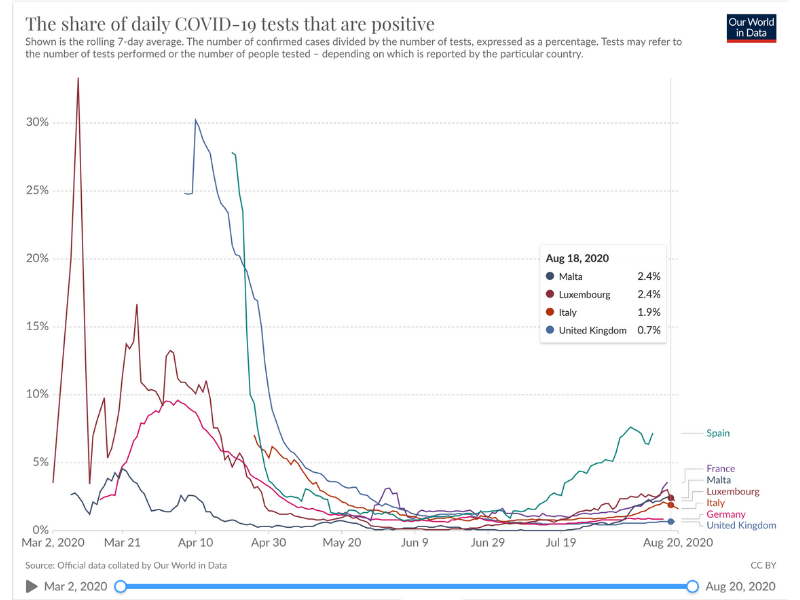
Graph showing the date when Malta had registered 2.4% in share of daily tests that were positive
The Labour Party video was posted on Facebook on 19 August. This percentage will continue to change, and it certainly cannot be presented as set figures.
Masking a message
It was at least a minor relief to see that all the footage in the promotional video showed Robert Abela wearing his mask and abiding by social distancing rules, two things he has consistently refused to do while carrying out other official duties such as press conferences or when going about his business.
It was an even bigger relief that at the end of this upbeat video with its cherry-picked data, the Prime Minister assured us that the health and well-being of the Maltese people was the government’s highest priority, and will continue to be so until the pandemic is over. Huzzah to that! Hoist up the yacht bunting.
The video is an attempt to counter mounting criticism of the government’s mishandling of the situation.
If Malta’s infection rate were as fabulously low as the video says it was, then a number of countries would not be restricting Maltese travellers, with Switzerland being the latest to put Malta on its obligatory quarantine list.
If Malta is so safe, then why did Universal Studios decide against sending its first film production unit to shoot in Malta? No doubt it’s because of other countries working against Malta, as usual, or those spoilt Hollywood brats who don’t understand the greatness of our government.
The public is growing tired of mixed, conflicting messages and the tweaking of regulations, and the medical community is exasperated.
To now cherry-pick which datasets to show your supporters in an attempt to create a false sense of confidence and to save face is in bad faith, and verges on the criminally negligent.

